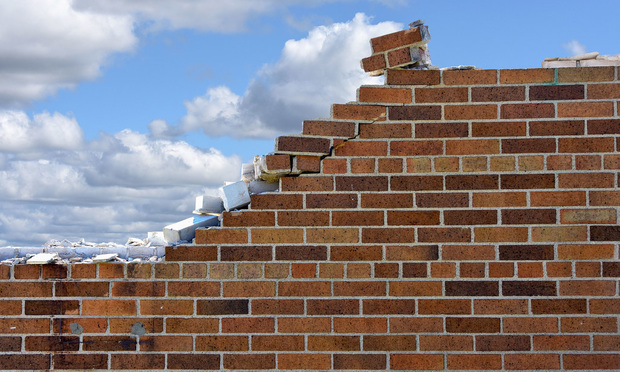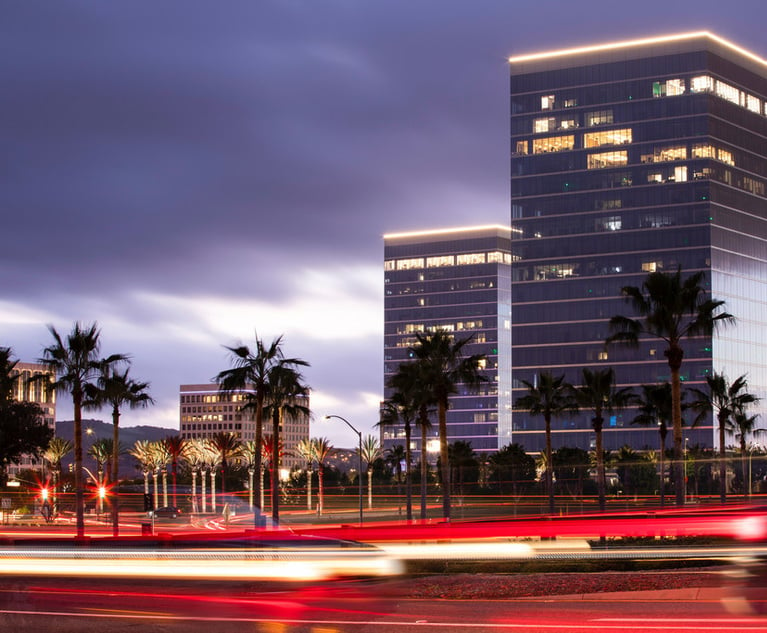In Neighbors' Dispute, Lawyers Seek to Undo Judge's Finding That Racism Was Motivating Factor
A San Mateo County judge found that a couple's “hostile behavior” toward Chinese immigrant neighbors was “more likely than not a product of racism.” The couple's lawyers claim the judge made the finding with no evidence and want him to walk it back or seal it.
January 24, 2019 at 03:01 PM
6 minute read

What started with a Burlingame couple suing over a damaged retaining wall has resulted in a judicial finding they're “more likely than not” racist toward their Chinese immigrant neighbors.
Gregory and Deborah Cosko sued their neighbors in February 2015 claiming that a construction crew working on the driveway next door damaged their retaining wall to the point it had to be replaced.
Those claims eventually settled.
But the Coskos' neighbors, Jane Liao and Jason Zhang, filed counterclaims of their own. Liao and Zhang alleged the Coskos set up a camera on the fence between the two houses to monitor them and their contractors. The camera, they claim, scared off the contractors, and they assert that the Coskos further sent a series of harassing emails—both to them and to city officials.
San Mateo County Judge V. Raymond Swope last year sided with Liao and Zhang on their counterclaims, awarding them $88,400 in economic damages for the construction delay, $100,000 in additional noneconomic damages for emotional distress and $250,000 in punitive damages. The judge also barred the Coskos from recording or photographing their neighbors' property going forward or walking on the narrow gravel strip between the two addresses.
After bench proceedings that spanned eight trial days from March to October 2017, Swope, in a statement of decision issued in July 2018, found that Deborah Cosko, in particular, was “resentful, rancorous and malevolent” toward her neighbors during trial.
“Her hostility was palpable,” Swope wrote. Swope concluded that “the Coskos' hostile behavior is more likely than not a product of racism toward these Chinese immigrants.”
The judge found that when considered together, the Coskos' “spying” on their neighbors' yard and sending emails and complaints to the city were “a course of conduct that was unconscionable and outrageous, and would offend any average member of the community.”
The judge highlighted Liao's testimony that the Coskos' conduct was “like an octopus with all the legs going everywhere in her life.” The judge further noted there was evidence in the record that the Coskos offered to buy the Liao and Zhang property shortly after their neighbors purchased it. The judge, however, did not point to any explicitly racist language from the Coskos.
“In a civilized and decent society, such conduct is inconsistent with being a good neighbor,” the judge wrote. “Good neighbors do not harass and videotape their other neighbors, and drive off their contractors. At a construction site, good neighbors do not complain about paint brushes cast upon on their side of the fence. Good neighbors do not complain about water bottles thrown from the other side of the fence onto their property. Good neighbors simply retrieve these items and throw them away. Good neighbors do not send harassing e-mails and letters to the city on matters that are easily resolvable.”
The Coskos' lawyers, Brian Hannon and Stephanie Southwick at Greenfield Draa & Harrington in San Jose, who signed onto the case post-trial, are asking Swope to roll back portions of his decision dealing with the purported “hostile behavior,” or alternatively seal the decision or “redact the objectionable portions.” They claim that there is no evidentiary support for the judge's finding that racism was a motivating factor for the Coskos. No one, including opposing counsel, they argue, raised the specter of racism in the case before the judge's final decision. The Coskos' lawyers point out the judge didn't raise the issue in his prior tentative ruling, delivered orally at a February 2018 hearing in the case, and said their clients never had a chance to defend themselves from the claim.
“Wrongfully labeling a person as a 'racist' is intolerable, especially when it is a court of law that is doing so,” the Coskos' lawyers wrote. “Here, even though neither Mr. Cosko nor Mrs. Cosko is a 'racist,' the opprobrium that almost surely will result from being falsely labeled as such will cause them untold harm, including irreparable damage to their reputation and livelihood.”
The Coskos' filing notes that Gregory Cosko is the president and CEO of Hathaway Dinwiddie Construction Co., a large San Francisco-based construction firm. Cosko, whose company has worked on recent high-profile projects, including The Exchange in Mission Bay and the Salesforce Tower, was named one of the San Francisco Business Journal's “Most Admired CEOs” in 2016.
“In view of the Court's unsupported finding that Mr. Cosko is a 'racist,' it is not an exaggeration to state that the company's present as well as future clients may be very reluctant — to say the least — to retain Hathaway Dinwiddie whose chief executive officer in the eyes of the law is a 'racist,'” wrote his lawyers. “It also is not an exaggeration to state that Mr. Cosko's employment status could very well be adversely affected should this Court refuse to act,” they continued.
In an emailed statement, Southwick said: “Because this is a pending matter, I refer you to the pleadings filed by my office which set forth my clients' position.”
Teresa Li, the lawyer representing Liao and Zhang, filed court papers Tuesday opposing the motion to seal or modify Swope's decision. Li wrote there was “substantial evidence to justify the racism finding.” In particular, Li pointed to evidence that the Coskos offered to buy the house as soon as they learned the race of the new buyers and Deborah Cosko continued to complain to the city even after learning that her neighbors had the appropriate permits in hand for their construction project.
“If the Coskos were merely concerned about Liao's permit situation, her complaint should have stopped after being informed that Liao's project had [the] proper permit,” Li wrote. “The reason that she did not stop again shows her conduct is racially motivated. Liao and Zhang's counsel argued this during her closing.”
Li declined to comment beyond the court filings.
A hearing on the Coskos' motion is scheduled for Feb. 4.
This content has been archived. It is available through our partners, LexisNexis® and Bloomberg Law.
To view this content, please continue to their sites.
Not a Lexis Subscriber?
Subscribe Now
Not a Bloomberg Law Subscriber?
Subscribe Now
NOT FOR REPRINT
© 2025 ALM Global, LLC, All Rights Reserved. Request academic re-use from www.copyright.com. All other uses, submit a request to [email protected]. For more information visit Asset & Logo Licensing.
You Might Like
View All
Redeveloping Real Estate After Natural Disasters: Challenges, Strategies and Opportunities
6 minute read
Buchalter Hires Longtime Sheppard Mullin Real Estate Partner as Practice Chair

After Solving Problems for Presidents, Ron Klain Now Applying Legal Prowess to Helping Airbnb Overturn NYC Ban
7 minute read
DOJ, 10 State AGs File Amended Antitrust Complaint Against RealPage and Big Landlords
4 minute readTrending Stories
- 1ACC CLO Survey Waves Warning Flags for Boards
- 2States Accuse Trump of Thwarting Court's Funding Restoration Order
- 3Microsoft Becomes Latest Tech Company to Face Claims of Stealing Marketing Commissions From Influencers
- 4Coral Gables Attorney Busted for Stalking Lawyer
- 5Trump's DOJ Delays Releasing Jan. 6 FBI Agents List Under Consent Order
Who Got The Work
J. Brugh Lower of Gibbons has entered an appearance for industrial equipment supplier Devco Corporation in a pending trademark infringement lawsuit. The suit, accusing the defendant of selling knock-off Graco products, was filed Dec. 18 in New Jersey District Court by Rivkin Radler on behalf of Graco Inc. and Graco Minnesota. The case, assigned to U.S. District Judge Zahid N. Quraishi, is 3:24-cv-11294, Graco Inc. et al v. Devco Corporation.
Who Got The Work
Rebecca Maller-Stein and Kent A. Yalowitz of Arnold & Porter Kaye Scholer have entered their appearances for Hanaco Venture Capital and its executives, Lior Prosor and David Frankel, in a pending securities lawsuit. The action, filed on Dec. 24 in New York Southern District Court by Zell, Aron & Co. on behalf of Goldeneye Advisors, accuses the defendants of negligently and fraudulently managing the plaintiff's $1 million investment. The case, assigned to U.S. District Judge Vernon S. Broderick, is 1:24-cv-09918, Goldeneye Advisors, LLC v. Hanaco Venture Capital, Ltd. et al.
Who Got The Work
Attorneys from A&O Shearman has stepped in as defense counsel for Toronto-Dominion Bank and other defendants in a pending securities class action. The suit, filed Dec. 11 in New York Southern District Court by Bleichmar Fonti & Auld, accuses the defendants of concealing the bank's 'pervasive' deficiencies in regards to its compliance with the Bank Secrecy Act and the quality of its anti-money laundering controls. The case, assigned to U.S. District Judge Arun Subramanian, is 1:24-cv-09445, Gonzalez v. The Toronto-Dominion Bank et al.
Who Got The Work
Crown Castle International, a Pennsylvania company providing shared communications infrastructure, has turned to Luke D. Wolf of Gordon Rees Scully Mansukhani to fend off a pending breach-of-contract lawsuit. The court action, filed Nov. 25 in Michigan Eastern District Court by Hooper Hathaway PC on behalf of The Town Residences LLC, accuses Crown Castle of failing to transfer approximately $30,000 in utility payments from T-Mobile in breach of a roof-top lease and assignment agreement. The case, assigned to U.S. District Judge Susan K. Declercq, is 2:24-cv-13131, The Town Residences LLC v. T-Mobile US, Inc. et al.
Who Got The Work
Wilfred P. Coronato and Daniel M. Schwartz of McCarter & English have stepped in as defense counsel to Electrolux Home Products Inc. in a pending product liability lawsuit. The court action, filed Nov. 26 in New York Eastern District Court by Poulos Lopiccolo PC and Nagel Rice LLP on behalf of David Stern, alleges that the defendant's refrigerators’ drawers and shelving repeatedly break and fall apart within months after purchase. The case, assigned to U.S. District Judge Joan M. Azrack, is 2:24-cv-08204, Stern v. Electrolux Home Products, Inc.
Featured Firms
Law Offices of Gary Martin Hays & Associates, P.C.
(470) 294-1674
Law Offices of Mark E. Salomone
(857) 444-6468
Smith & Hassler
(713) 739-1250






